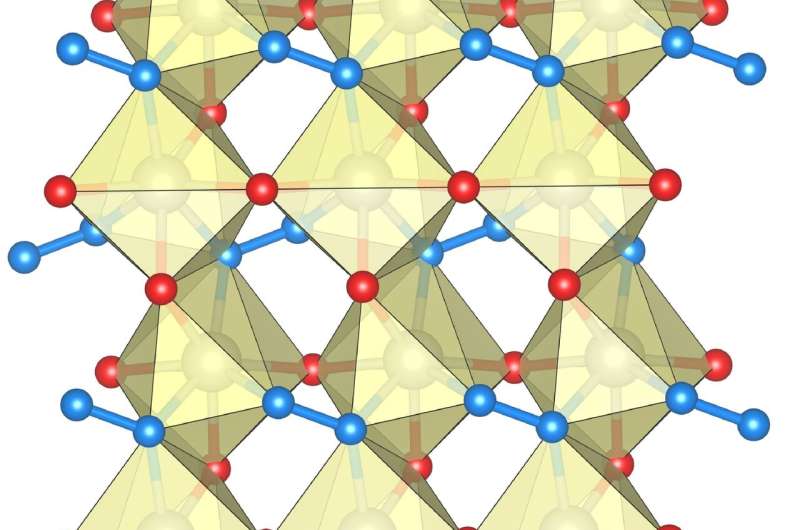Extremely hard yet metallically conductive: Researchers develop novel material with high-tech prospects

An international research group led by scientists from the University of Bayreuth has produced a previously unknown material: Rhenium nitride pernitride. Thanks to combining properties that were previously considered incompatible, it looks set to become highly attractive for technological applications. Indeed, it is a super-hard metallic conductor that can withstand extremely high pressures like a diamond. A process now developed in Bayreuth opens up the possibility of producing rhenium nitride pernitride and other technologically interesting materials in sufficiently large quantity for their properties characterisation. The new findings are presented in Nature Communications.
The possibility of finding a compound that was metallically conductive, super-hard, and ultra-incompressible was long considered unlikely in science. It was believed that these properties could not occur simultaneously in the same material and were therefore incompatible. But this prejudice has been soundly refuted by the research work now published, which has passed through two stages of development in Hamburg and Bayreuth:
Initially, the scientists synthesized the rhenium nitride pernitride in high-pressure experiments in a laboratory at the University of Bayreuth, and subsequently characterised it chemically and structurally at the German Electron Synchrotron (DESY). Under a compression pressure of 40 to 90 gigapascals, small amounts of this material were produced in a diamond anvil cell. Re2(N2)(N)2 is its chemical formula. "The crystal structure that we discovered in Hamburg's synchrotron X-ray facility PETRA III surprised us very much: It contains both single nitrogen atoms and the N-N nitrogen dumbbells, in which two nitrogen atoms are strongly bound to each other. This internal structure obviously creates a very high resistance to pressure acting on the crystals from the outside: Rhenium nitride pernitride is ultra-incompressible," says Dr. Maxim Bykov, postdoctoral researcher at the Bavarian Research Institute of Experimental Geochemistry & Geophysics (BGI) at the University of Bayreuth.
Here at BGI it was subsequently possible to produce the new material in a large-volume press at a significantly lower pressure (33 gigapascals). "Applications of the large-volume press technology for materials synthesis are of great importance to materials science," emphasizes Prof. Dr. Tomoo Katsura of the Bavarian Geo Institute. At the heart of the new process is a reaction of rhenium with ammonium azide. The rhenium nitride pernitride synthesized in this way can be investigated under ambient conditions. And the process can be used for the synthesis of other nitrides, in particular nitrides of transition metals, which could also have technologically important properties. This research therefore shows in exemplary fashion just what innovation can come out of high-pressure research in materials science. "Although the exact scope of application for the new material is still hard to grasp, its exceptional combination of physical properties makes rhenium nitride a material that can help meet the technological challenges of the future," explains Prof. Dr. Natalia Dubrovinskaia of the Laboratory of Crystallography at the University of Bayreuth.
"What is important about our new study, however, is not only the results as such, or the technological applications that might one day spring up. What is particularly exciting is that the development and synthesis of the new material contradicts and clearly disproves previous views that were firmly established in materials science. We have succeeded in doing something that, according to earlier predictions, should not have been possible at all. This should stimulate and encourage further theoretical and experimental work in the field of high-pressure material synthesis," explains Prof. Dr. Leonid Dubrovinsky from the Bavarian Geo Institute, who coordinated the international research work together with Prof. Dr. Natalia Dubrovinskaia.
More information: Maxim Bykov et al. High-pressure synthesis of ultraincompressible hard rhenium nitride pernitride Re2(N2)(N)2 stable at ambient conditions, Nature Communications (2019). DOI: 10.1038/s41467-019-10995-3
Journal information: Nature Communications
Provided by University of Bayreuth


















